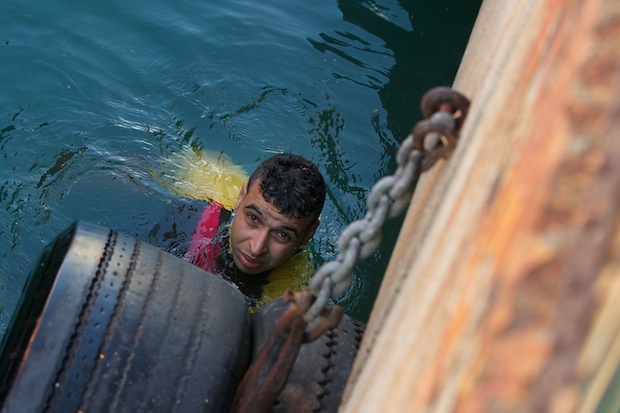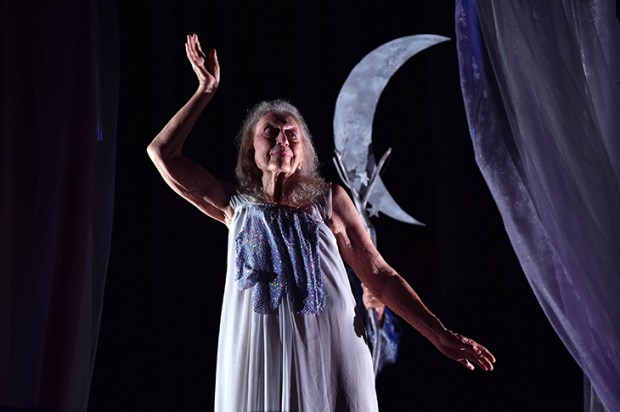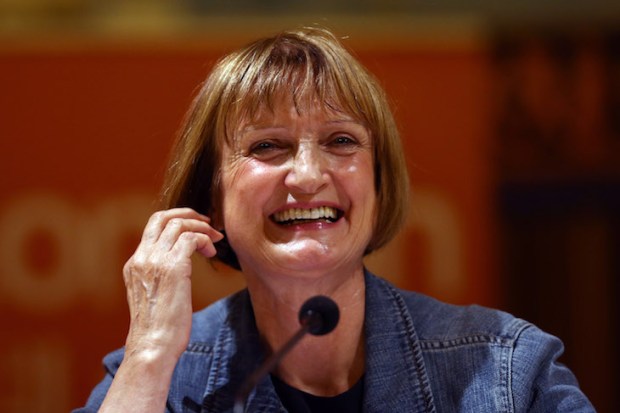‘Brown is very good — no Cameron. David Cameron no good,’ he said. Just in case we weren’t sure what he meant, he repeated, ‘Brown I like. Labour government I like. I like the Brown. I like the Tony Blairs. David Cameron no good.’ It was such an odd thing, to hear praise for Gordon Brown, and doubly so because it came from an asylum-seeker who had never been to the UK. He was talking to Michael Goldfarb in Calais, while trying to find a way to get across the Channel.
It’s almost four years since Brown left office. His tenure as PM is rarely, if ever, talked about in the UK. Yet here he was on a pedestal, above even Tony Blair, and put there by a refugee from the Afghan wars who could hardly speak English.
Yet it was not the oddest moment on From Kabul to Kent (Radio 5 Live, Saturday). Goldfarb’s real focus was Ali, who was forced to leave his home in an Afghan village in 1999, aged just 14. The Taleban were searching for recruits and press-ganging anyone with gun-toting potential. Ali managed to escape, after dark, with the help of his uncle. It took him two years to reach Calais, hitching lifts, walking for hundreds of miles, using every resource he had to survive, without family, funds or any knowledge of foreign languages, only to find himself stuck in Sangatte, the camp for refugees set up by the Red Cross, just half a mile from the entrance to the Channel Tunnel. How now was he to reach his goal — England?
Ali walked out of Sangatte in broad daylight and jumped on to the back of a train. When it slowed down at the entrance to the tunnel (where the police were waiting on the lookout for stowaways), he found a hiding place under the wheel of a lorry. ‘Literally I was sitting by the wheel,’ he remembers. ‘Just to get where you could have a life, be a human.’
You have to be desperate to take such a risk, and incredibly lucky to survive, too. But what makes Ali’s story so unusual is the way he speaks English, half-posh (from working with the army), half-estuary (from his first months in Gravesend); his willingness to abandon his Afghan past (‘I have no family’); and his work for the MoD, helping to train British soldiers before they are deployed to Afghanistan.
Ali will never go back to his village. His home now is in the UK; on his passport he’s a UK citizen. But every few weeks he puts on traditional Afghan costume (which he never would have worn as a child), decamps to an army base in Wiltshire or else in Norfolk, and stays in a replica Afghan village, creating imaginary scenarios intended to teach soldiers how to deal with the Afghans they might meet in the line of duty.
It’s all in the details. That image of Ali crouching by a thick black tyre. Of the mock Afghan village on Salisbury Plain with its too-green grass and lack of chickens scrabbling in the dust. The way that the army officers involved in acting out the role-plays in Wiltshire talked about leaving for ‘the theatre’ in Afghanistan.
With his writer’s eye for the telling detail, Amit Chaudhuri captured the essence of Calcutta in Reimagining the City (Radio 4, Saturday), produced by Rachel Hooper. Not the usual portrait of that Indian city — squalor, Mother Teresa and the gothic grandeur of the Victoria Memorial. Chaudhuri instead drew us to the clothes lines he stumbles across everywhere while walking through the city on the decrepit, uneven pavements. For the homeless, a road sign or plastic street barrier becomes a useful tool for drying out their monsoon-drenched saris.
Chaudhuri walks down the narrow lanes and notices the carvings on the shabby, neglected Bengali houses, the first bungalows. He notices the light as darkness falls; the blueish-whiteish light of fluorescent bulbs, used for reading and studying. These are for him the main landmarks of the city. It’s the ‘city of humdrum’, says Chaudhuri, and of what lies hidden within the humdrum. You can find a surprising silence amid that dense tapestry of car horns, street cries, screeching parakeets, which he has never found anywhere else except in India. That sense of emptiness in the midst of so much life, of the sacred surrounded by industrial fumes and decaying buildings.
In just half-an-hour, Chaudhuri had convinced me I must go there, not to Kolkata (its new name, derived from Bengali, but isolated from its past, its history, its ancient character, a ‘dead word’ in English, says Chaudhuri), but to Calcutta, which was always its Indian name before the British took it over and tried to make it their own. Walk through its lanes, urges Chaudhuri, to sense that past and be constantly surprised. To make a film, all you would need to do is walk through the city for 24 hours; there’s always ‘so much narrative happening by itself’.
Got something to add? Join the discussion and comment below.
Get 10 issues for just $10
Subscribe to The Spectator Australia today for the next 10 magazine issues, plus full online access, for just $10.
You might disagree with half of it, but you’ll enjoy reading all of it. Try your first month for free, then just $2 a week for the remainder of your first year.














Comments
Don't miss out
Join the conversation with other Spectator Australia readers. Subscribe to leave a comment.
SUBSCRIBEAlready a subscriber? Log in